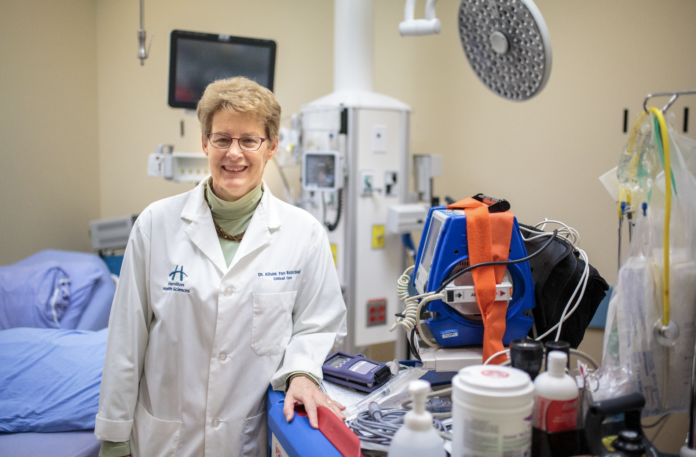From targeted population studies to global longitudinal assessments, Hamilton has demonstrated global leadership in delivering trans-disciplinary clinical trials.
More than 40 health research institutes bring hundreds of clinicians, researchers and scientists together with entrepreneurs and multi-national companies to validate health innovation from radio-pharmaceuticals to medical devices to in-clinical processes.
Around the World, Around the Block
Population Health Research Institute (PHRI) is a world leader in large clinical trials and population studies. With a staff of 350 PHRI oversees more than $150 million in clinical trials each year. With unparalleled trans- disciplinary expertise in epidemiology and population health, PHRI’s capacity to conduct multiple international studies concurrently, with tens of thousands of participants in each, is a capability few can match.
To date, PHRI has enrolled more than a million participants on six continents and in 101 countries. It is now undertaking one of the most extensive population health studies in the world, involving 200,000 people across 25 countries.
Hamilton’s “culture of enquiry and challenging established thinking” and ability of researchers to collaborate locally, nationally and internationally built PHRI, says its founder Dr. Salim Yusuf. It tackles “important health questions by thinking big, globally, and conducting research that is high impact and makes a difference to people’s lives worldwide.” A former World Health Foundation president, Dr. Yusuf is an internationally renowned cardiologist and epidemiologist, who was the second-most cited researcher in the world in 2011.
“We are particularly proud of our culture of mentoring and developing young investigators, working on new themes of the interfaces of different disciplines, and the willingness to explore potentially risky topics using innovative approaches that few other research groups focus on,“ said Yusuf.
The expertise of PHRI was spun off into the for-profit Bay Area Research Logistics (BARL)
in 2007 to provide logistics services for large international trials conducted by research institutions, biotech companies, pharmaceutical organizations and academic researchers from around the world. In 2017, BARL was chosen to run all of GSK clinical trials in Canada.
Learning about Living Longer
The Canadian Longitudinal Study on Aging (CLSA), the largest long-term study ever undertaken in Canada is exploring how 50,000 participants age and how to shape policy around disease prevention and health services.
The CLSA data is made available to researchers, entrepreneurs, urban planners
and policy-makers in real-time, allowing for immediate innovation and the commercialization of novel health technologies and processes to tackle the health and social burdens of aging populations.
Fighting Allergic Disease
AllerGen NCE Inc. is a national research network hosted by McMaster University dedicated to supporting research, commercialization and capacity-building activities that contribute to reducing the morbidity, mortality and socio-economic impact of allergic disease. Dr. Judah Denburg, the scientific director at AllerGen, oversees one of the largest practices in allergy and immunology in Canada.
The Canadian Healthy Infant Longitudinal Development (CHILD) Study, hosted by St. Joseph’s Healthcare, is following 3,500 mothers and children. CHILD is the largest multidisciplinary, longitudinal, population-based birth cohort study in Canada, and one of the most informative studies of its kind in the world. Data on how genetics and early childhood environmental exposures impact asthma, allergies and other chronic childhood diseases have led to more than a dozen key discoveries that are changing medical practice, consumer product regulation and public policy.
Innovating on the Hospital Floor
Dr. Alison Fox-Robichaud, a critical care physician professor of medicine, had two innovative ideas: drastically cut code blue events, and a bedside device to test for sepsis.
The Hamilton Early Warning Score (HEWS) Dr. Fox-Robichaud developed reduced code blue events from 400 to just 54. “HEWS is harnessing technology to push the right information to the right people to decrease code rates,” said Fox-Robichaud. A digital bedside monitoring system that tracks abnormalities in a patient’s vital signs to detect subtle indicators of declining health before a critical event, HEWS is now deployed across multiple locations.
The Thrombosis and Atherosclerosis Research Institute (TaARI), earned an international reputation for innovation excellence, beginning with the world’s first clinical trial demonstrating the effectiveness of using aspirin to prevent stroke.
Today, a multi-disciplinary TaARI team led by Dr. Fox-Robichaud, has developed a bedside device to quickly detect the presence of sepsis, a condition which kills more people in Canada than heart attacks. The TaARI device zeroes in on biomarkers that will predict what patients are at risk for life- threatening sepsis earlier than traditional lab tests.
“Hamilton has always been an environment of collaboration. There is a critical mass to enter the technology development world but it’s small enough that people are willing to work together here.”
















